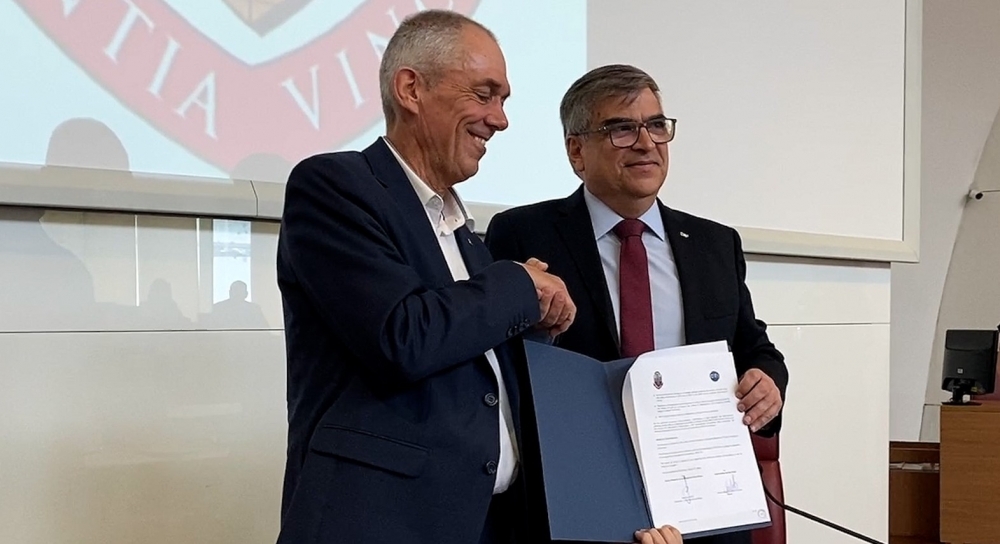

Antoine Petit, CEO of CNRS, and Carlos Gilberto Carlotti Júnior, Rector of USP, signed a protocol of intentions yesterday to establish a joint research center (photo: Phelipe Janning/Agência FAPESP)
France’s leading public-sector scientific research organization already has similar partnerships in the US, UK and Japan. FAPESP President Marco Antonio Zago expressed interest in supporting projects conducted at the center to be set up in São Paulo, Brazil, focusing on areas such as oceanography, biodiversity, and sustainability.
France’s leading public-sector scientific research organization already has similar partnerships in the US, UK and Japan. FAPESP President Marco Antonio Zago expressed interest in supporting projects conducted at the center to be set up in São Paulo, Brazil, focusing on areas such as oceanography, biodiversity, and sustainability.

Antoine Petit, CEO of CNRS, and Carlos Gilberto Carlotti Júnior, Rector of USP, signed a protocol of intentions yesterday to establish a joint research center (photo: Phelipe Janning/Agência FAPESP)
By Karina Toledo | Agência FAPESP – The University of São Paulo (USP) in Brazil and France’s National Center for Scientific Research (CNRS) will launch an International Research Center (IRC) in early 2024. This will be the fifth unit of the kind established by CNRS, which already has similar partnerships with the University of Arizona and the University of Chicago in the United States, Imperial College London in the United Kingdom, and the University of Tokyo in Japan.
“The aim is to develop scientific cooperation between our two countries, taking Brazilian students and researchers to France and sending French students and researchers to Brazil. There is no specific area of interest. The IRC will resemble an ‘umbrella’ under which we can conduct a range of activities that will evolve over the years. In five years’ time, for example, it’s possible that these activities will include collaboration in quantum computing, which we won’t be doing from the word go, or perhaps in mathematics or oceanography. We can sign as many agreements as we like, but what we really need is for Brazilian and French researchers to be interested in collaborating with each other,” Antoine Petit, Chairman and CEO of CNRS, told Agência FAPESP.
A protocol of intentions to set up the IRC was signed on March 6 by Petit and Carlos Gilberto Carlotti Júnior, Rector of USP, during a ceremony held in the university’s boardroom in São Paulo city, and attended by Yves Teyssier d’Orfeuil, French Consul General in Brazil; Vahan Agopyan, São Paulo State Secretary for Science, Technology and Innovation; Marco Antonio Zago, President of FAPESP; Fernando Menezes, Administrative Director of FAPESP; and Maria Arminda do Nascimento Arruda, Vice Rector of USP, among other authorities.
“We already have a well-established partnership with CNRS in the humanities and do research in areas such as energy and the environment. We’ll base ourselves on the existing initiatives and seek new partnerships so that we can have an interdisciplinary and multidisciplinary center, making this bridge between Brazil and France,” Carlotti Júnior said.
The plan is to hold a series of workshops in Brazil and France later this year in order to foster interaction among researchers from the two countries and identify topics of mutual interest. “We expect to be ready to sign the agreement establishing the IRC and set up a laboratory in January 2024,” he added.
Ocean science
Before the ceremony, the CNRS delegation met with senior executives of FAPESP, which has had a cooperation agreement with the French institution for almost 20 years. During the meeting, Zago emphasized FAPESP’s intention of supporting research projects conducted by the IRC and said ocean science was one of the areas of special interest.
“We’ve talked about the possibility of establishing an agreement involving São Paulo state, France – via CNRS – and Argentina. Partnering with Argentina is very important for us because it would give us an opportunity to do large-scale research in the Arctic and South Atlantic,” he said.
Luiz Eugênio Mello, Scientific Director of FAPESP, highlighted the many possibilities in research relating to the use of thorium, an abundant metal in Brazil, to generate nuclear power. He also stressed the possibility of partnerships with companies along the lines of the Engineering Research Centers (ERCs) supported by FAPESP. Other areas of interest mentioned during the meeting were biodiversity and sustainability.
CNRS representatives attending the meeting at FAPESP included Alain Schuhl, Deputy CEO for Science; Christelle Roy, Director, European Research and International Cooperation; Jean Thèves, Deputy Director, International Relations; Sylvie Rousset, Director, Open Research Data; and Saman Musacchio, Manager, International Communications.
CNRS is the largest scientific research organization in the public sector in France and one of the most important in the world, with an annual budget of 4 billion euros. Its activities span practically all knowledge areas in more than a thousand research units and certified services, mostly involving partner institutions.
The strategy of setting up international research centers with universities in other countries began about two years ago, according to Petit. “We aim to have a limited number of centers worldwide. In five or ten years, it could reach ten or 15 centers – not more than that. At least one will be with USP, with which we have an important partnership,” he said, adding that the visit aimed to intensify scientific cooperation with Brazilian institutions. “And FAPESP is one of our main partners. Our first agreement was signed about 20 years ago. We’d like to extend this collaboration still further.”
Since 2004, FAPESP and CNRS have issued 18 joint calls for proposals, resulting in financial support for 106 collaborative research projects.
Republish
The Agency FAPESP licenses news via Creative Commons (CC-BY-NC-ND) so that they can be republished free of charge and in a simple way by other digital or printed vehicles. Agência FAPESP must be credited as the source of the content being republished and the name of the reporter (if any) must be attributed. Using the HMTL button below allows compliance with these rules, detailed in Digital Republishing Policy FAPESP.





